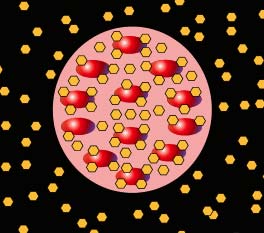Knowing early diabetes complications through blood tests
Many diabetics have severe cardiovascular, kidney, and eye complications . without knowing it, especially when they see blood sugar decrease at the time of blood test. But if you do a test called HbA1c, they may be frightened to know that the illness is still severe, and there are complications.

Sugar molecules attach to the blood pigment in red blood cells.(Photo: Med4you)
Professor Tran Van Tho, Chairman of Endocrine Association - diabetes, said, diabetes causes serious complications on most organs in the body, such as myocardial infarction, atherosclerotic cerebral hemorrhage. arteries, right leg necrosis, kidney failure, blindness . Because the disease develops silently, when diabetes is detected, 50% of cases have complications.
In controlling diabetes, Vietnamese people mostly pay attention to fasting and postprandial blood glucose testing for 2 hours. This index provides information about blood sugar at the time of trial. Therefore, the low blood sugar level does not mean that the disease is really well controlled and without complications.
To assess whether blood sugar is well controlled in a process, and the prognosis of complications, patients need to do HbA1c testing , which measures the ratio of A1c hemoglobin in red blood cells. HbA1c is the hemoglobin that binds glucose in the blood. The more blood sugar you have, the more HbA1c is present. Because red blood cells have a lifespan of 120 days, the HbA1c test is worth reporting the blood sugar level of the last 3 months.
Therefore, HbA1c not only evaluates the patient's treatment results in the past 3 months but also indicates the occurrence of complications . This index is high, indicating that the patient has or is about to have very serious complications. For people who first detect diabetes, this test is useful in assessing how well the disease is, which the fasting blood sugar index cannot " say ".
Professor Tho said, currently only about 18% of diabetics under treatment in Vietnam have good control of HbA1c. Patients who only need to change their diet for a few days have been able to reduce fasting blood glucose levels, but the HbA1c index only decreases when patients follow a diet, exercise, and medication for several months. Therefore, this is the most honest indicator to evaluate treatment results.
Dr. Nguyen Khoa Dieu Van, Deputy Head of Endocrinology Department of Bach Mai Hospital, Hanoi, said that HbA1c only needs to reduce by 1%, the patient has 43% less amputation risk, 37% risk of kidney failure, blindness and significant reduction in other complications such as myocardial infarction, stroke .
Dr. Yun advised that diabetics should do HbA1c testing every three months. This test price is about 70-100 thousand VND. The patient may not need to fast before taking blood. In Hanoi, this test was done at Bach Mai Hospital, Central Endocrinology Hospital.
Hai Ha
- What blood tests can you know about?
- Physical exercise prevents diabetes complications
- Blood test method helps detect cancer 5 years early
- Women should be tested with what?
- Vaccines for type 1 diabetes will be tested on humans in 2018
- History of nearly 100 of insulin - the source of life for people with diabetes
- Things to know about general blood tests
- Blood tests can detect Alzheimer's disease
- What is diabetes? Causes and ways to treat diabetes
- Find out how to detect ovarian cancer early
- Eye tests can detect Alzheimer's disease
- Mask for preventing blindness caused by diabetes complications
 Green tea cleans teeth better than mouthwash?
Green tea cleans teeth better than mouthwash? Death kiss: This is why you should not let anyone kiss your baby's lips
Death kiss: This is why you should not let anyone kiss your baby's lips What is salmonellosis?
What is salmonellosis? Caution should be exercised when using aloe vera through eating and drinking
Caution should be exercised when using aloe vera through eating and drinking